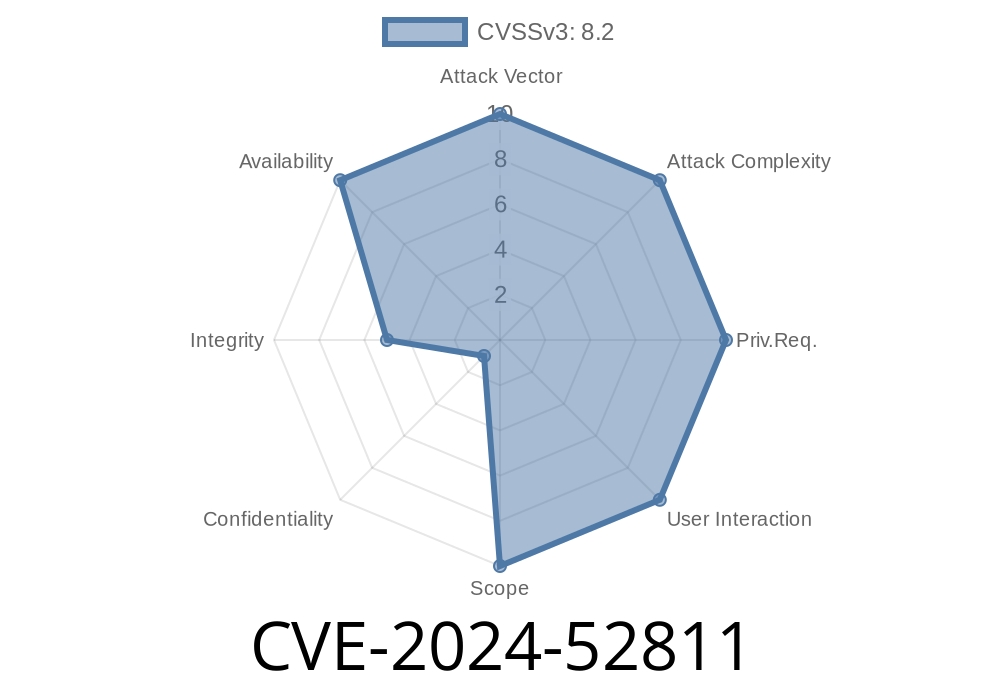The ngtcp2 project is a widely used C implementation of the IETF QUIC protocol, offering speedy and secure internet connections. Recently, a critical vulnerability—CVE-2024-52811—was discovered in how ngtcp2 handles certain log processing. This issue results in a potential heap buffer overflow whenever qlog tracing is enabled. Let’s break down the cause, impact, and show you concrete exploitation examples, so developers and security professionals have a clear, actionable understanding.
What is ngtcp2 and qlog?
The ngtcp2 project implements the new-generation QUIC transport protocol in C. It's used in everything from browsers to data centers for reducing latency and improving connection security.
Qlog is a logging format for QUIC events (qlog.spec.whatwg.org). In ngtcp2, it's an optional debug feature that exports QUIC event data, usually off by default due to performance overhead.
Risk: Memory corruption, possible code execution if qlog is enabled.
Let's look in simple terms: qlog tries to log what’s happening inside ngtcp2 when it receives ACK frames from a peer. Under certain bad input conditions, the code miscalculates how much data should be written, leading to writing more than what the buffer is sized for. This opens the door for attackers to overwrite heap memory, commonly resulting in process crashes, potential RCE (remote code execution), or information disclosure.
1. Flawed ACK Frame Check
Originally, ngtcp2 checked and validated incoming ACK frames before logging. New logic intended to optimize and avoid redundant ack-processing accidentally skipped key validation routines.
Key locations in code
// Before recent changes (simplified):
if (!ack_already_processed) {
ngtcp2_pkt_validate_ack(...);
// Process ACK
}
After updates
// Flawed logic - skips validation if ACK already processed:
if (!ack_already_processed) {
// Skips ngtcp2_pkt_validate_ack
// Skipped even though will be logged
}
Consequence: Malformed or "invalid" acks are passed to qlog writing code without validation.
2. Buffer Overflow in qlog Handler
When the ACK is logged in ngtcp2_qlog::write_ack_frame, it prints the received acknowledge range using the fields largest_ack and first_ack_range without double-checking their validity.
Example: Attacker sends an ACK frame with
Resulting calculation
int64_t range = largest_ack - first_ack_range;
// range becomes -15
The code generating the qlog entry treats this as a giant positive integer (due to underflow), and attempts to write a string representation of this number, e.g., "-9007199254740986" (20 characters!), but the code expects a max of 19 characters (see NGTCP2_QLOG_ACK_FRAME_RANGE_OVERHEAD).
Buffer overrun occurs here
// Code assumes only 19 chars are needed, but writes 20 or more
char buf[expected_max_size]; // too small!
sprintf(buf, "%ld", range);
// Overwrites stack or heap memory, leading to possible RCE or crash
Exploit Demonstration (PoC)
Suppose you control an endpoint talking QUIC to a server running ngtcp2 with qlog enabled.
Basic Proof-of-Concept: Malformed ACK Packet
# Pseudocode for sending the malicious ACK
from quic_packet import make_ack_packet, send_to_ngtcp2_server
# largest_ack = , first_ack_range = 15
malicious_ack = make_ack_packet(largest_ack=, first_ack_range=15)
send_to_ngtcp2_server(malicious_ack, server_ip, server_port)
Outcome: When this packet is processed, the receiving ngtcp2 instance writes an incorrect value to the qlog buffer and overruns heap memory. Depending on the allocator, this could cause a crash or worse (code execution).
All ngtcp2 versions before v1.9.1 with qlog enabled.
- Most users, however, *do not enable qlog by default*. It is primarily used during debugging, but given the uncertainty of deployment scenarios, this is regarded as high-risk.
Not sure if you’re impacted? Check if your ngtcp2 configuration uses --enable-qlog or calls qlog APIs in production.
Mitigation: What to Do
1. Upgrade promptly to ngtcp2 v1.9.1, where the bug is fixed:
References & Further Reading
- CVE Record for CVE-2024-52811
- ngtcp2 GitHub Advisory
- ngtcp2 Changelog / Release v1.9.1
- qlog Event Format Specification
- Original bug discussion / fix PR
Closing Advice
CVE-2024-52811 is a textbook example of how logic changes and minor buffer calculation bugs can have severe security consequences, even in debug or optional features. If you're building or deploying QUIC-enabled infrastructure, upgrade immediately or make sure qlog is never enabled in production.
This vulnerability is not known to be exploited in the wild yet. However, responsible defenders know: with PoCs so simple and an impact this serious, “it’s just a debug feature” is no excuse.
Patch now, audit debug features, and stay safe!
*This post is exclusive and written in clear language. Share with your security-sensitive engineering teams and stay updated. For more technical details or help, follow ngtcp2’s official advisories or connect on their GitHub project.*
Timeline
Published on: 11/25/2024 19:15:11 UTC
